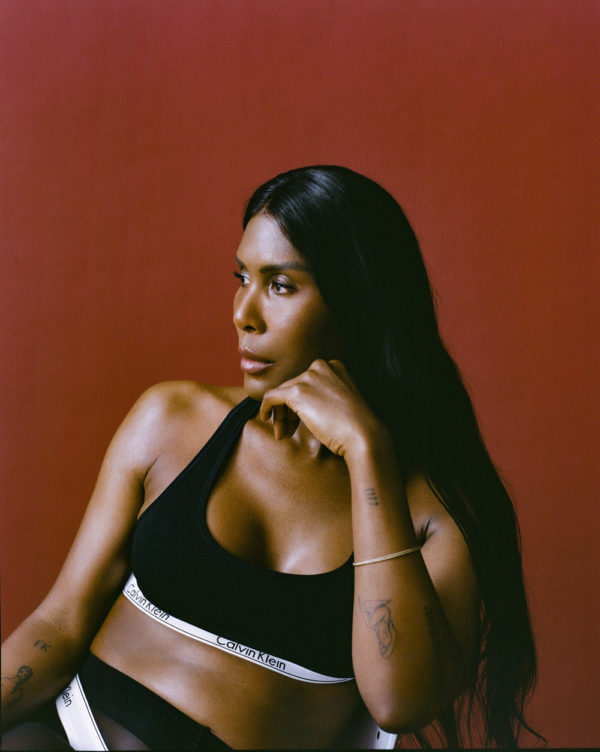
PHOTOGRAPHY BY MATT LAMBERT
HONEY DIJON
Honey Dijon has been DJing since she was a kid at her parents’ house parties in Chicago. While she’s been a longtime mainstay of house music and queer party scenes since moving to New York in the 1990s, the last few years she’s really grown, doing everything from creating mixes for Kim Jones’s Louis Vuitton menswear shows to headlining dance festivals in Europe to launching her own clothing brand with Comme des Garçons, titled Honey Fucking Dijon (exactly!). Honey was refreshingly open and honest when we spoke, serving up plenty of pearls of wisdom — it was a pleasure to spend some time with her.
When you were a kid you used to DJ at your parent’s parties. I was curious if you remember which songs and artists you were playing? Like many African-American families, music was a huge part of our lives. My parents were middle-class/working-class, and every weekend they would have these massive parties. It was awesome because I would sit at the edge of the stairs and I would hear glasses clinking and people cursing each other out. I was just so attracted and drawn to that energy. I think the laughter and the joy was probably the thing that really attracted me because it just seemed like people were having such a good time. I grew up at a great time when there was a lot of conscious music — you know, music was one of the things that helped black people deal with oppression and racism and all of these things. The music that I heard growing up was everything from Donna Summer to Michael Jackson to Marvin Gaye to Roberta Flack. So that was my early introduction to music through my parents’ basement parties. And then at a certain point I loved music so much and I was always playing music so my mom would let me play some records. I just love to share music. I think there’s so much excitement in sharing music with other people.
You grew up in Chicago, correct? What were some of the clubs you first went out to? I grew up on the South Side of Chicago. Back then house music started in Black queer clubs. But they weren’t what we think of as clubs today, they weren’t like mega at all. You know, most of the clubs were in pubs. I actually got introduced to disco and house music through DJs who would play at our school dances. And when I got into high school, we would take the bus to school and people would be playing bootleg cassettes (I’m dating myself here) from the club the night before.
The clubs that I was going to back then, you have to understand, at that time we didn’t have all the regulation and security that we do now. I mean, it was just such a different worldand especially when it came to people of color spaces, they weren’t policed because Black lives aren’t valued as much and queer Black lives weren’t valued as much. And so you only had to be 16 or 18 to get in these juice bars. I was able to get a fake ID and on a Friday night I’d tell my mom that I was going over to a friend’s house to study and then I would hit the clubs. My mother hates that story, she thinks she’s a terrible parent. Every time she reads or hears me say that, she’s like, “I don’t want people to think that I was a bad mother.” I’m like, “look at me now, mom, I’m quite successful. I don’t think you were a bad parent. I think it worked.”
I mean, that was where it all started. And also, you know, I was really bullied as a child. And so I think when I found these places that celebrated queerness and difference, it was like a revelation. And then the soundtrack was good too. It was like, “this is what I want to do the rest of my life.”
What was the first paid gig you ever did as a DJ? God, I think the first paid gig was my friend’s birthday party. He asked me to play because he’d heard me DJ. I had started this Monday night party on the Lower East Side 5,000 years ago. You have to understand that I’d always bought and collected music ever since I was like 12 years old. I never threw any music away. So I was building a record collection without even knowing it. Like a lot of bullied children, music was my savior. I would just stay in my room for hours, dancing with myself to the music that I loved and really learning how to be my own company, which has really paid off in the long run. I think a lot of people don’t know how to be their own company, and while there is no good side to being bullied, it’s horrible, I think you can come out many different ways. For me, I learned how to be with myself and I learned how to be with the music. I would listen to music for hours. I would read who styled the photo, the album cover photo, read the credits, read the lyrics to the songs. I mean, I studied everything from A to Z. The music was my friend in a way. But getting back to your question, my first paid gig, I think it was like a hundred bucks to DJ at my friend’s birthday party.
And how long until you could support yourself as a DJ? I only became a DJ, a successful one in 2018. I mean, like, “define success.” There’s a difference between success and visibility as a DJ. I think success for me was when I was able to make a living only DJing. And that was a slow thing. It was quite challenging for me, I think as a trans person and especially a trans person of color. You have to learn to speak so many different languages in so many different communities and groups because you don’t fit in, there’s no mirror of affirmation for you. Especially because there’s so much misogyny and racism within the gay community. And then in the straight community, there’s so much homophobia, transphobia, racism. As a marginalized person, I had to be able to move within different scenes just to try and find who I was or where I fit in. And I realized I don’t fit in any place at all, so I should just do my own thing. It’s a revelation when you are like, “wait, no, I don’t fit in any place, so I might as well just do what I want to do.” It’s very scary, but it’s very liberating.
To get to that place where you could sustain yourself as a DJ, how long did that take? It took a really, really long time because the only safe spaces for me pre-transition and once I transitioned were gay clubs and I didn’t come from a white gay club experience. I came from Black house music culture, which was super diverse, all types of people. Like many trans women, I was a drag artist before I transitioned and I made my living in gay white clubs and I didn’t even know much about show tunes or Broadway or pop stars. When I started performing, I was just lip-synching to house music songs because that’s what I loved. So when I started DJing in these white gay spaces, I wasn’t really understood because I wasn’t playing pop music and I wasn’t playing circuit music. I was playing this music that I loved and I had to adapt that in order to eat. It was many, many, many, many years that I was working in these worlds. I would do the things that I needed to do as a DJ. And then also I’d take those really low paid DJ gigs for the love of the music. You have to understand this is pre-Internet, so everything was super segregated.
The straight promoters wouldn’t book me because I wasn’t playing straight enough and then the gay promoters weren’t booking me because I wasn’t playing gay enough. It was a very difficult, long journey and I would DJ at anything. I’d DJ the opening of a restaurant, a wedding.
In my industry it’s called “reading a room,¸” being able to go into a space and being able to entertain as well as educate, knowing what to play to that crowd. And I think my being able to do that came from not fitting in and learning how to connect with different people.
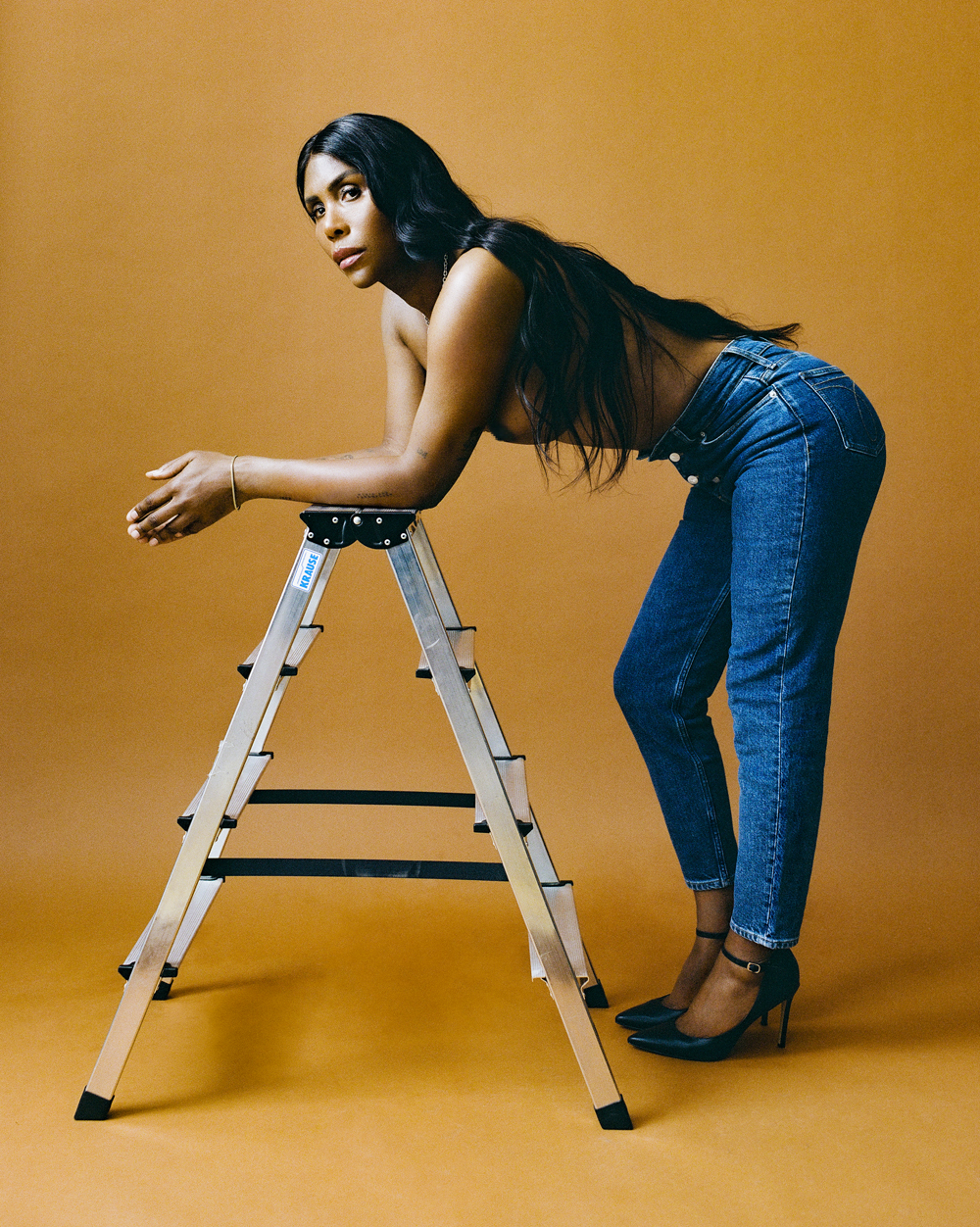 Jeans by Calvin Klein.
Jeans by Calvin Klein.
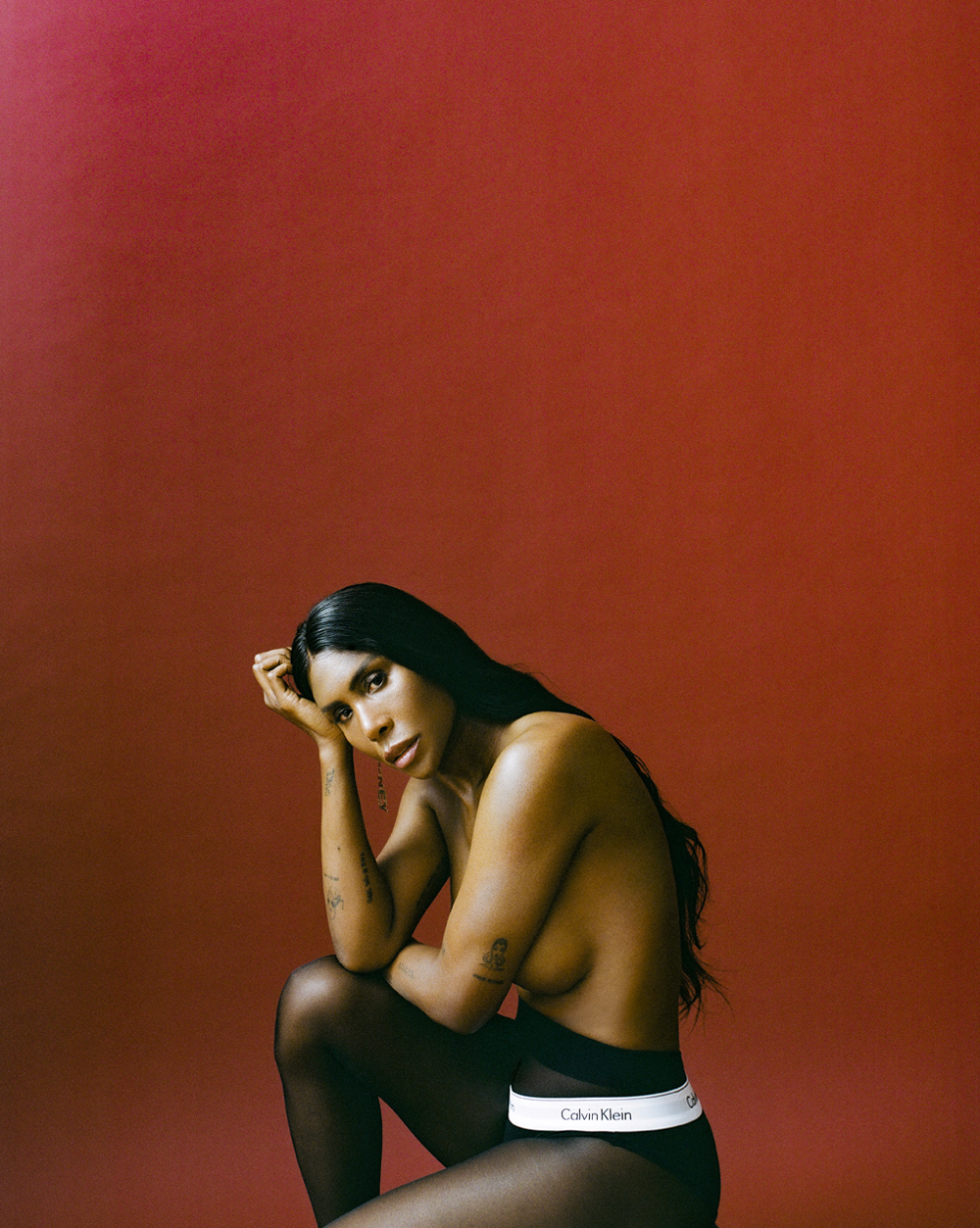 Panties by Calvin Klein.
Panties by Calvin Klein.
Are there any rooms now that you still feel intimidated to enter? Only weddings because you’re gonna have everyone from the grandmother to the eight year-old child there and you can’t please them all. So weddings, I won’t do. They treat you like a jukebox and I’m not a jukebox, you know?
How have your fashion world collaborations come about, I’m thinking specifically about the mixes you’ve made for Kim Jones’ menswear shows? Well, a lot of the relationships that I have with people who are at the top levels of the fashion industry were friends and people who I knew before they became designer stars or whatever. I’ve had a 15-year relationship with Kim. I’ve known Riccardo Tisci for almost the same amount of time. And, you know, I wasn’t intimidated by them. And I think this goes back to one of the gifts of being a trans person or a marginalized person and not fitting in in that it forces you to be yourself. I’m not different in any environment. I’m the same person because I’ve had to be able to have a sense of my humanity in order for me to navigate all aspects of the world. Sometimes I’m more intimidated being at the grocery store, being mis-gendered, that sort of stuff is intimidating, not the fashion stuff or these rarefied bubbles because I feel that I belong and I have something to contribute and that’s why I’m there.
But I’m happy that my success happened to me at a time in my life where I’m a fully formed human being, and I don’t get my gratification externally from other people or things. Like I’m still going to be Honey Dijon if I’m not working with these people or I don’t have my face on a magazine or I don’t have all of this spotlight, I’m still going to be me. I still have to be good with myself. And I’m happy that that was developed before social media metrics because when all of this attention is shifted from you to someone else or something new and you don’t have that sense of self, you’re going to be fucked. The only time I’m intimidated in any situation is when I’m not respecting who I am and what I have to offer.
How did you get to this place? I have a really dear friend, my bestie, and we talk a lot. He’s a gay Black man and he’s also a really well-respected artist and DJ at the top of his craft. Together we talk about everything, life, relationships. I think you’re really lucky if you get really great friends who can also be mentors and teachers, and then you do the same for others. I’ve just had some really great life lessons. One of them was when I realized that, especially during the pandemic, when you saw how governments were handling it, no one knows what they’re doing. It’s liberating because when you realize they don’t even know what the fuck they’re doing, you question why you’re giving other people so much power over your emotional wellbeing. One of the phrases that I live by is “just because someone told you something, doesn’t make it true.” And “he who wins the war, writes the book.” A lot of things that we know, or that we accept about ourselves, is because someone told us. We just went along with it and didn’t question it. And maybe a lot of people oppress other people from their own limitations. And so I refuse to live my life based on someone else’s limitations. That’s not gonna happen.
There is a communion and a transcendence that can be felt on a dancefloor while listening to an amazing DJ. I’m so curious as a DJ, when you sense that energy in the room, do you feel that as much as the people dancing? Of course. I mean, it’s what you hope and pray for. It’s like really great sex. But you don’t always get those moments. It’s a shamanistic experience when the stars are aligned and every record that you play, the crowd responds enthusiastically — you’re dancing and they’re dancing. The problem is trying to keep it because it takes only one wrong record to clear the dance floor, but you have to not be afraid to clear the dance floor. I mean, I’m not afraid to clear the dance floor because I’ll get them back. But it’s a wonderful feeling.
What is the best city to play in? Wherever they pay me.
Have there been any cities that surprised you? Places that don’t have a history of club culture have been challenging for me. I think one of the most challenging places that I played in was China because they just don’t have the same relationship to the culture of how it was founded. And so they only know what they’re being presented. And whoever presented it to them may not have had the same information that I come with. And I think playing in countries that have not had as many human rights or freedoms as we do in the west have been the most challenging places. It’s surprising because I think a lot of times when you DJ you think people are gonna understand where you come from and they don’t. How could they? No one can walk in your shoes. So you try to do the best that you can and meet them halfway and just show up. Not every night is going to be great. You take the good with the bad and you keep moving. I’m just fucking lucky I get to do this. I just have a great attitude, anytime I show up to the decks.
In terms of the world beyond DJing, how did it feel like to be included in the current Calvin Klein campaign and what’s your relationship to the brand over the years? It felt like, “Finally!” My relationship to Calvin Klein started with my love of fashion and you know, like I said before, being a bullied person, fashion and music were my safe spaces. And so I wanted to know anything and everything. One of my favorite photographers in the world was Richard Avedon who did the infamous Brooke Shields commercials that I still watch on YouTube all the time because they’re so amazing. For me Calvin Klein is attached to a time, my favorite time in history, you know, which is New York in the late seventies and early eighties. And just seeing all of the old issues of Interview with the CK ads. I mean, those ads were so groundbreaking — it was all about Studio 54 and that glamorous nightlife in New York in the early eighties. And then in the nineties Steven Meisel did their advertisements — he’s another favorite fashion photographer of mine.
As a black trans woman, I never considered myself a model for anything, you know, I never thought that I would have that opportunity to be in a Calvin Klein campaign, although I’m still waiting for my billboard on Houston Street. I just never thought it was possible because trans women, especially Black trans women, aren’t held up as beauty standards or ideals. So when the phone call came, it was just really great to be a part of that legacy.
Do you feel comfortable being vulnerable and naked in front of a camera? Oh my God, I’m only going to have this body for so long, so I might as well sell it while the shop is still open because you know I don’t want it to be resale. But listen, it took me a long, long, long time to be okay. You know who said something to me once that was really transformative? Anohni. Anohni talked about self-hating on your body when you’re trans — we’re always told that anytime we talk about trans ness that it’s always in reference to what type of body we have. I know this is going to be a very controversial statement, but for me, I don’t feel like I was born into the wrong body. I was born into the body that I have. As long as I had two ears, two arms, two hands, as long as I could walk, I could shit, I could swallow, I could think, I could blow my nose, that’s not a wrong body. For other people who aren’t trans to understand it, we’ve had to keep propelling this narrative, “I was born in the wrong body.” I don’t agree with that though. I think the body that you’re born into is the one that you have. And thank God we live in a time when we can change things so that they align more with how we feel spiritually and intellectually because transness is different for different people. For some people it’s intellectual. For some people it’s political. For some people it’s how they feel. There’s not one way to be trans, it means different things for different people. So I’ve never felt like I had the wrong body. I felt I may have been born in the wrong culture or the wrong society but this is the only body that I’m going to have my entire life so why am I going to spend all that time hating on it?
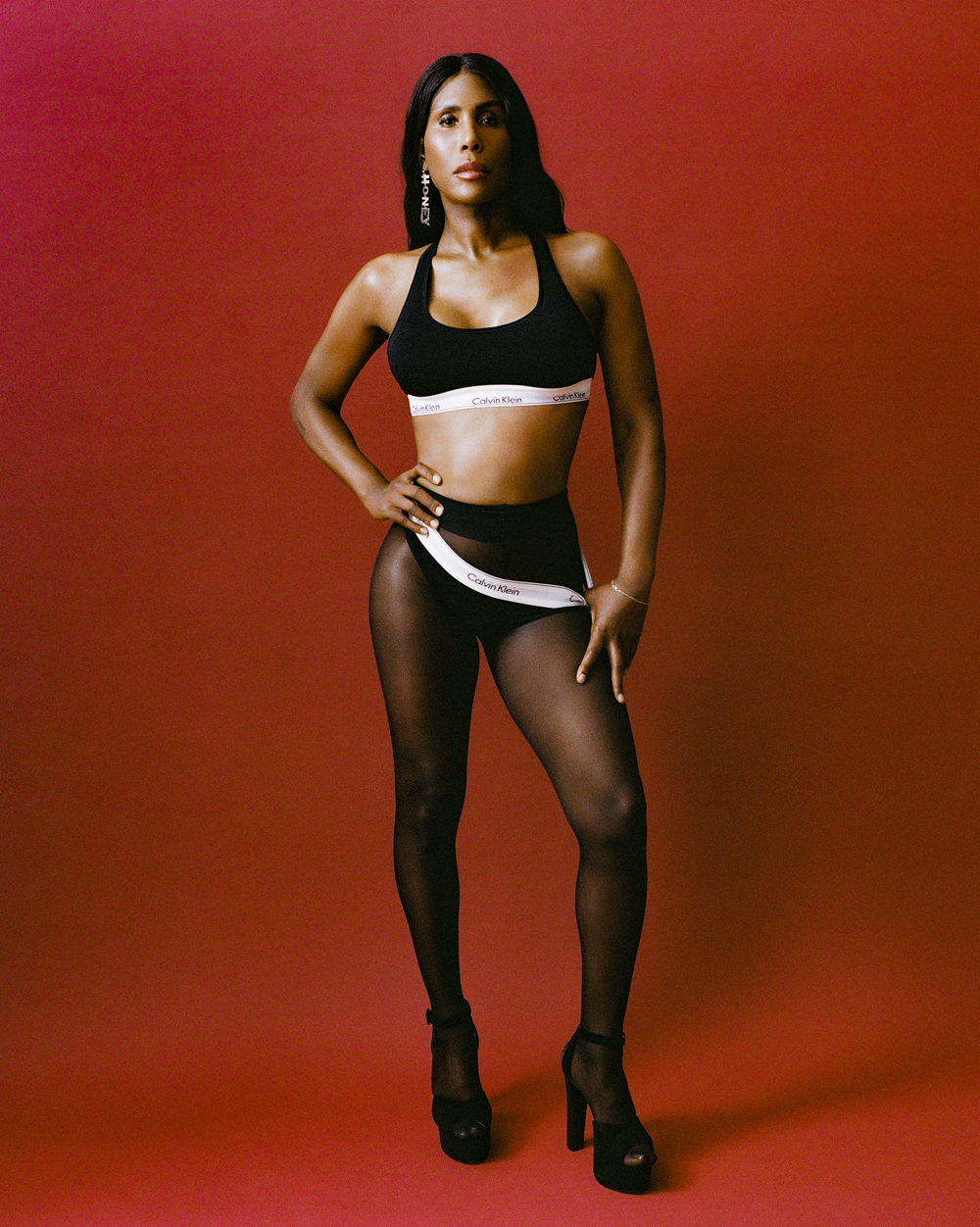 Bralette and panties by Calvin Klein.
Bralette and panties by Calvin Klein.
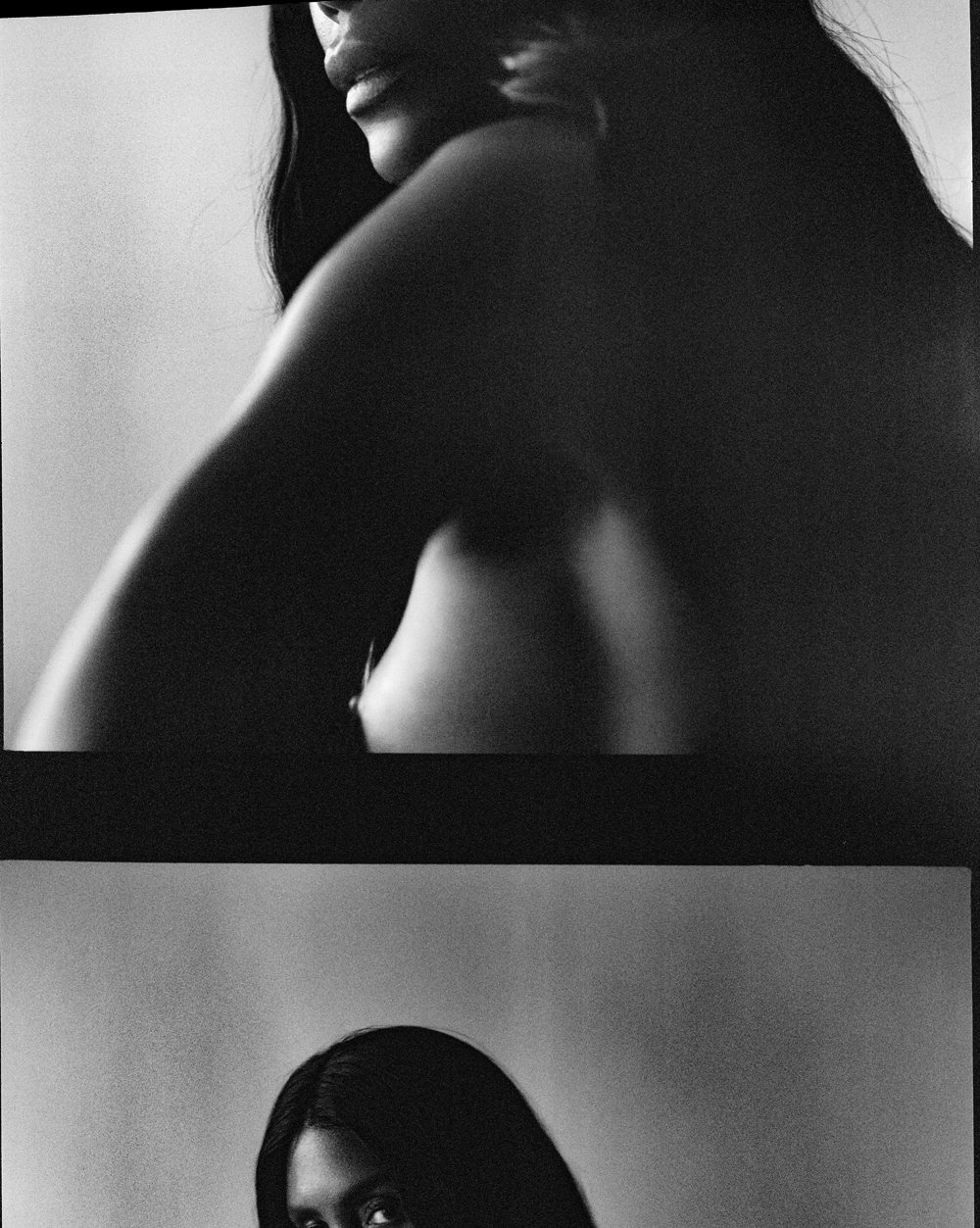
That’s a really good perspective on it. The narrative around transness is so simplistic because it’s so new to mainstream culture. It’s because they’re comparing it to being binary, heteronormative, and that’s not working for them. Heteronormativity doesn’t work for heterosexuals. So what the fuck? The binary doesn’t work either.
What’s your favorite quality in a friend? Honesty.
What’s your favorite quality in a lover? Lust.
What is your most marked characteristic? Humor.
What is a trait you deplore in other people? Deception.
Which words or phrases do you most overuse? Mama. Mama does this, mama does that. Oh, mama’s coming here. I call myself mama in the third person. I say that shit all the time. Oh, and motherfucker.
What or who is the greatest love of your life? Me.
What would you consider your greatest achievement? Me.
How would you like to die? I wouldn’t.
What is your most treasured possession? Health.
Where would you like to live? Now.
Where are you happiest? At the bank. You thought I was going to say the DJ booth, huh?
I had no expectations. Not having expectations without agreements will save you a lot of time.
Explain that to me. My partner is a life coach. He said that a lot of times we have expectations of things and of other people without someone agreeing to them.
Do you have a motto? My motto is, “stop looking for yourself in other people.” I think we get really disappointed because we think, “well, why did that person behave that way? I wouldn’t have done that.” Or, “I wouldn’t have treated this person like that.” And, “why did he treat me like this?” Stop looking for yourself in other people. And so this goes back to expectations without agreements. Most people will not do business the same way that you do. Most people’s value systems aren’t the same as your value system. Most people bring different things to sex, love, relationships, careers, everything. So stopping having expectations without agreements and stop looking for yourself in other people go hand in hand.
Can you tell us what you’re working on? Yes. I’m working on my sophomore album called Black Girl Magic, which will hopefully come out at the end of this year or early 2022. I’m working on the next collection for my fashion brand Honey Fucking Dijon, which is really exciting. I’m actually shooting the next campaign in New York with a bunch of people who have inspired me. It’s important for me to include more of our community in the imagery that I put out. Especially Black femme queens with certain bodies and trans women of color and to really celebrate the beautiful people that I come from because I’ve stopped looking at magazines and advertising to define what is beautiful for me. I come from such a rich and beautiful culture, and it’s important for me to reflect that in what I do in my fashion work.
How did the name for your fashion brand, Honey Fucking Dijon, come about? On a cheap futon while smoking lots of weed on the Lower East Side of Manhattan.
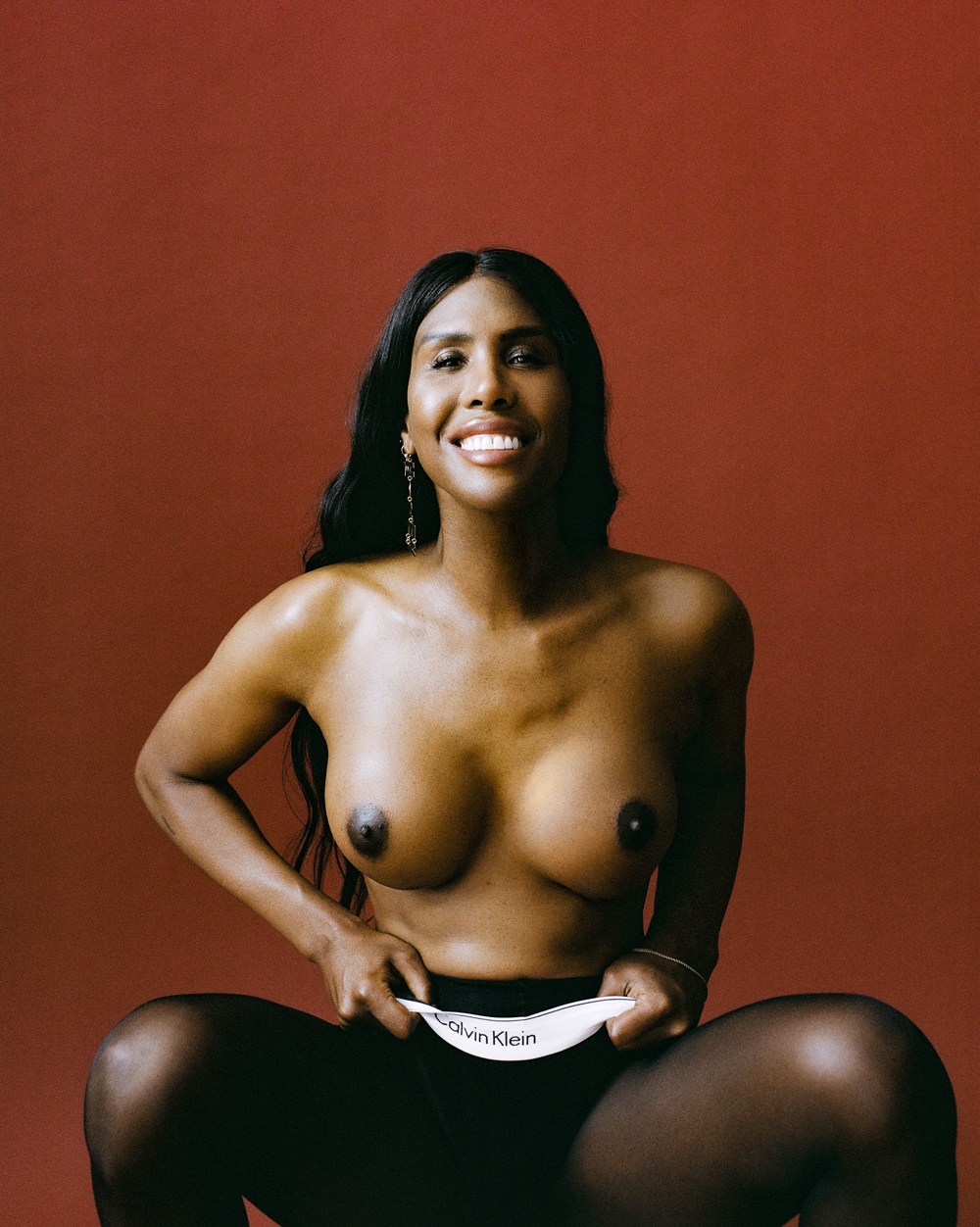 Honey Dijon wears panties by Calvin Klein. Photographed by Matt Lambert in Berlin, Germany. June 2021. Hair and Makeup by Christian Fritzenwanker.
Honey Dijon wears panties by Calvin Klein. Photographed by Matt Lambert in Berlin, Germany. June 2021. Hair and Makeup by Christian Fritzenwanker.
This cover story was printed in GAYLETTER Issue 14, for more get a copy here.